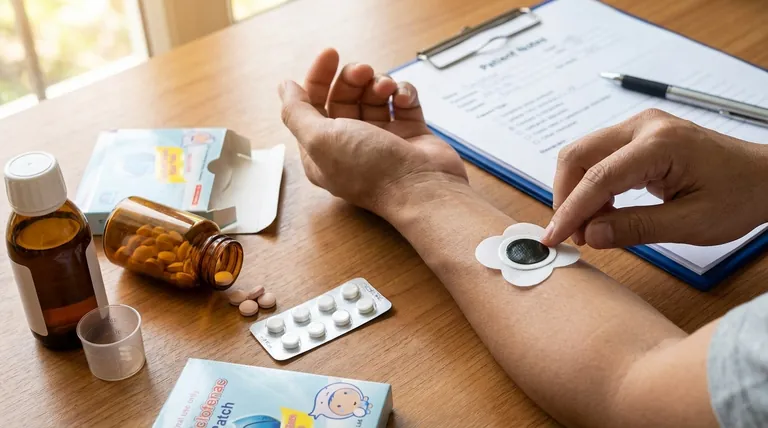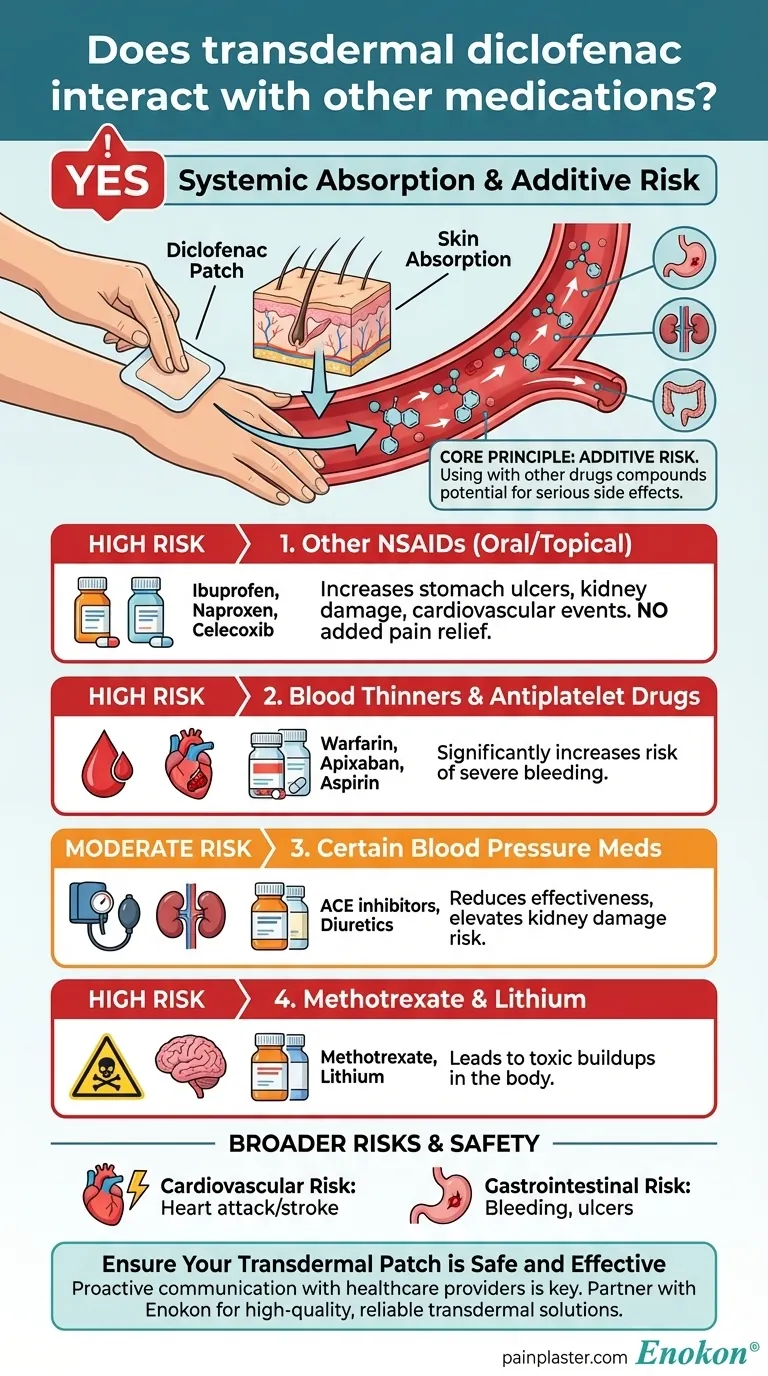Yes, transdermal diclofenac can interact with other medications. Although it is applied to the skin, the drug is absorbed into your bloodstream and can cause systemic effects and interactions. The primary concern is an increased risk of side effects when combined with other drugs that have similar properties, particularly other NSAIDs and medications that affect bleeding.
The core principle to understand is additive risk. While a diclofenac patch delivers a lower systemic dose than an oral pill, using it with other medications—especially other NSAIDs or blood thinners—compounds the potential for serious side effects like gastrointestinal bleeding and cardiovascular events.

How a Skin Patch Causes Systemic Interactions
Understanding Systemic Absorption
Even when applied topically, a portion of diclofenac passes through the skin and enters your bloodstream. This is how it can affect other parts of your body and interact with medications you take orally or by injection.
The Danger of Compounded Effects
Many drug interactions are not about one drug negating another. Instead, two drugs with similar potential side effects can dramatically increase the likelihood of those effects occurring when taken together.
Key Drug Interaction Categories to Know
Other NSAIDs (Oral or Topical)
This is the most significant and common interaction. Using a diclofenac patch while also taking oral NSAIDs like ibuprofen (Advil, Motrin), naproxen (Aleve), or celecoxib (Celebrex) is highly risky.
This combination does not improve pain relief but substantially increases the risk of stomach ulcers, kidney damage, and cardiovascular complications.
Blood Thinners and Antiplatelet Drugs
Diclofenac can interfere with blood clotting. When combined with medications designed to prevent clots, the risk of serious bleeding can become severe.
Key examples include warfarin, direct oral anticoagulants (apixaban, rivaroxaban), and even low-dose aspirin.
Certain Blood Pressure Medications
NSAIDs, including diclofenac, can reduce the effectiveness of several types of blood pressure drugs, such as ACE inhibitors (e.g., lisinopril) and diuretics (e.g., hydrochlorothiazide).
This combination can also elevate the risk of kidney damage, particularly in older adults or those with pre-existing kidney issues.
Methotrexate and Lithium
Diclofenac can decrease the body's ability to clear certain drugs from its system. This can lead to toxic buildups of medications like methotrexate (used for arthritis and cancer) and lithium (used for mood disorders).
Broader Risks and Side Effects to Consider
Cardiovascular Risk
All NSAIDs, including transdermal diclofenac, carry a warning for an increased risk of heart attack or stroke. This risk can occur without warning and may be higher for individuals with heart disease or those using the medication long-term.
Gastrointestinal Risk
NSAIDs can cause serious damage to the digestive tract, including ulcers, bleeding, or perforations in the stomach or intestines. While the risk is lower with topical application than with oral pills, it is not zero.
This risk is greater in older adults and those with a history of stomach problems, who smoke, or who consume alcohol regularly.
Making the Right Choice for Your Safety
Proactive communication with your healthcare provider is the most effective way to prevent harmful drug interactions. Always provide a complete list of every medication you take.
- If you take any other NSAID (like ibuprofen or naproxen): You should not use a diclofenac patch at the same time, as this leads to a dangerous overdose of NSAIDs.
- If you are on blood thinners or daily aspirin: You must consult your doctor before using transdermal diclofenac due to the significantly elevated risk of bleeding.
- If you take medication for high blood pressure or have kidney issues: Discuss this with your provider, as diclofenac can interfere with your treatment and potentially harm your kidneys.
- For all users: Always maintain a complete list of your medications, including over-the-counter products, vitamins, and herbal supplements, to share with your doctor and pharmacist.
Ultimately, your awareness and open dialogue with your healthcare team are your strongest tools for using this medication safely and effectively.
Summary Table:
| Medication Category | Interaction Risk | Key Examples |
|---|---|---|
| Other NSAIDs | High - Increases GI, kidney, and heart risks | Ibuprofen, Naproxen, Celecoxib |
| Blood Thinners | High - Significantly increases bleeding risk | Warfarin, Apixaban, Aspirin |
| Blood Pressure Drugs | Moderate - Can reduce effectiveness and harm kidneys | ACE inhibitors (Lisinopril), Diuretics |
| Methotrexate/Lithium | High - Can cause toxic buildup | Methotrexate, Lithium |
Ensure Your Transdermal Patch is Safe and Effective
Navigating medication interactions is critical for patient safety. As a bulk manufacturer of reliable transdermal patches and pain plasters, Enokon provides healthcare and pharma distributors and brands with technically advanced solutions. Our expertise in custom R&D and development ensures your products are formulated with safety and efficacy in mind.
Partner with us to develop high-quality, reliable transdermal solutions for your patients. Contact our experts today to discuss your needs.
Visual Guide

Related Products
- Asthma Cough and Pain Relief Patch for Adults and Kids
- Far Infrared Deep Heat Relief Patches Medicated Pain Relief Patches
- Mugwort Wormwood Pain Relief Patch for Neck Pain
- Menthol Gel Pain Relief Patch
- Icy Hot Menthol Medicine Pain Relief Patch
People Also Ask
- What types of coughs can the far infrared cough relief patch address? Soothe Dry, Wet, and Persistent Coughs
- Are pain relief patches safe for sensitive skin? Your Guide to Safe Use & Skin Testing
- Can pregnant women use pain relief patches? Your Essential Guide to Safe Pain Management
- How does the cough relief patch provide targeted relief? Direct, Soothing Comfort for Coughs & Chest Congestion
- How does the far infrared technology in the cough relief patch work? Enhance Natural Ingredient Delivery
















